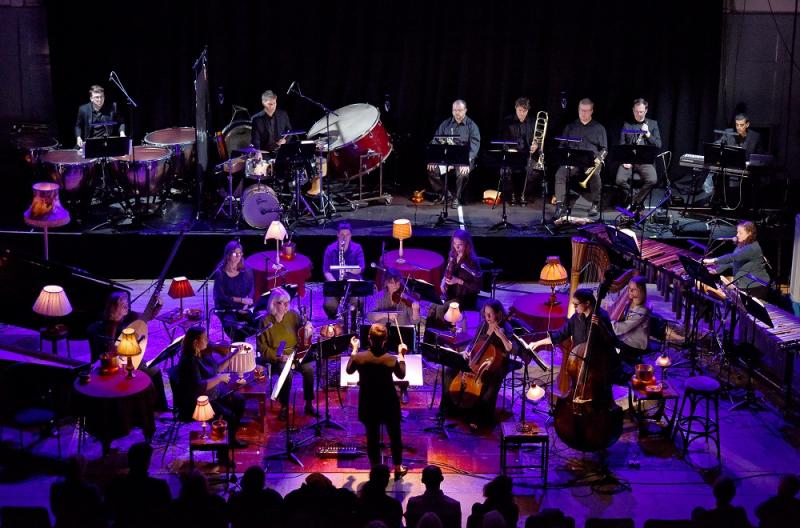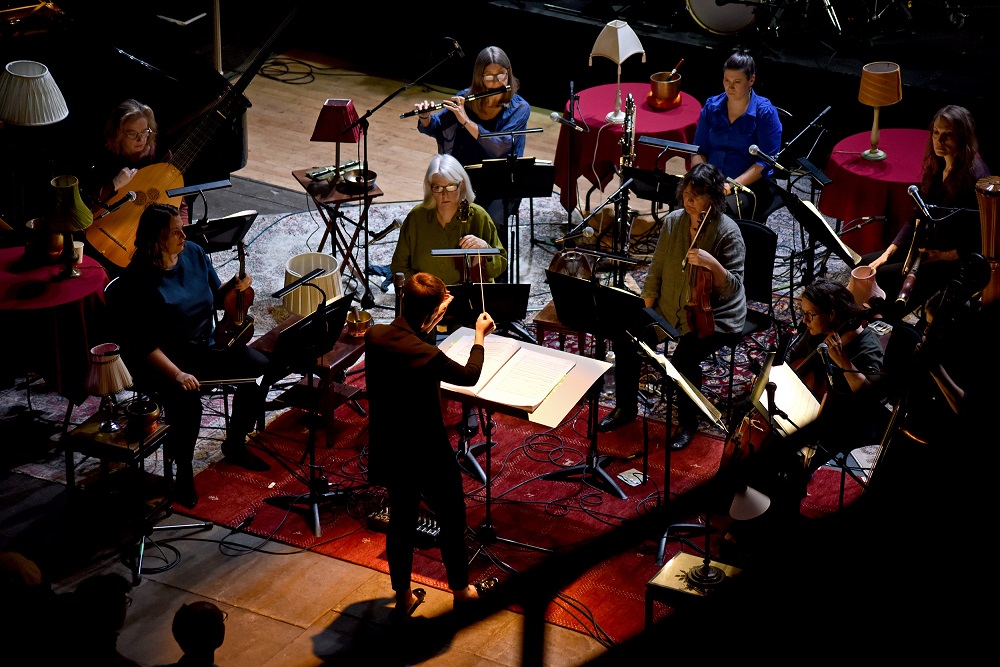Songs of Wars I Have Seen, RSNO, Dunedin Consort, Slorach, Queen's Hall, Edinburgh review - moving portrayal of wartime diaries | reviews, news & interviews
Songs of Wars I Have Seen, RSNO, Dunedin Consort, Slorach, Queen's Hall, Edinburgh review - moving portrayal of wartime diaries
Songs of Wars I Have Seen, RSNO, Dunedin Consort, Slorach, Queen's Hall, Edinburgh review - moving portrayal of wartime diaries
Heiner Goebbels' singular take on World War Two has poignant contemporary relevance

Songs of Wars I Have Seen is an hour-long through=composed work by contemporary German composer Heiner Goebbels which combines the music of 17th century composer Matthew Locke, the text from the wartime diaries of American Jewish writer Gertude Stein and Goebbels’s own ingenious musical and dramatic ideas.
First commissioned by the Southbank Centre and premiered in 2007, the work in this Scottish outing is a collaboration between the Royal Scottish National Orchestra and Baroque ensemble Dunedin Consort, with players from both on stage. The composer’s direction is that women are at the front and men at the back. Whether deliberate or not, all Dunedin Consort’s players for this performance were women, so there was a distinct divide between period and modern instruments as well.
Like a lot of writing from that time, Stein’s diaries capture as much of the mundanity and funny quirks of wartime living as well as her thoughts on the atrocities happening around her. In the post concert discussion, Goebbels mentioned his mother’s comment that he’d never lived through a war, and that’s probably true for most of the audience too. While in the UK we read of war in Russia, Ukraine, Syria, Israel and Gaza, the majority of Brits have zero lived experience of being in a war zone. It’s hard to comprehend the absurd awfulness of it all; perhaps by talking of things to which most of us can relate - the taste of honey, neighbourhood gossip, the state of one’s footwear - we can garner more affinity with the uglier, scarier experiences of someone living through a war.  This juxtaposition is evident in the music too. Goebbels’s writing is descriptive, evocative and even playful at times, while the interludes from Locke give a more sombre backdrop. The piece’s narrative is passed around the female performers, each reading a different excerpt and giving a different insight into Stein’s thoughts and life, with cleverly notated rhythm. Many of Stein’s musings are on cultural and national distinctiveness and difference, which made hearing such a breadth of accents from those on stage all the more heartening.
This juxtaposition is evident in the music too. Goebbels’s writing is descriptive, evocative and even playful at times, while the interludes from Locke give a more sombre backdrop. The piece’s narrative is passed around the female performers, each reading a different excerpt and giving a different insight into Stein’s thoughts and life, with cleverly notated rhythm. Many of Stein’s musings are on cultural and national distinctiveness and difference, which made hearing such a breadth of accents from those on stage all the more heartening.
The musical execution of this moving and expressive work was very fine indeed, with tight synchronicity from all players under Ellie Slorach’s artful conducting. Vibrant brass flutter tonguing and bowed percussion gave potent musical effects, alongside myriad recorded sounds including radio interference and overhead air traffic. Christopher Hart’s trumpet solo in one of the final movements - almost an ambient, jazz infused Last Post - was particularly haunting with a subtle reverb effect cleverly executed by the skilled sound engineer who really deserves a programme credit and doesn’t seem to have one.
Though most of its subject matter is from World War Two, this work is troublingly relevant today. Perhaps a piece such as this, which encourages personal contemplation rather than dictating a narrative, can be, in some small way, a tool to encourage a deeper human understanding.
rating
Explore topics
Share this article
The future of Arts Journalism
You can stop theartsdesk.com closing!
We urgently need financing to survive. Our fundraising drive has thus far raised £49,000 but we need to reach £100,000 or we will be forced to close. Please contribute here: https://gofund.me/c3f6033d
And if you can forward this information to anyone who might assist, we’d be grateful.

Subscribe to theartsdesk.com
Thank you for continuing to read our work on theartsdesk.com. For unlimited access to every article in its entirety, including our archive of more than 15,000 pieces, we're asking for £5 per month or £40 per year. We feel it's a very good deal, and hope you do too.
To take a subscription now simply click here.
And if you're looking for that extra gift for a friend or family member, why not treat them to a theartsdesk.com gift subscription?
more Classical music
 Hallé John Adams festival, Bridgewater Hall / RNCM, Manchester review - standing ovations for today's music
From 1980 to 2025 with the West Coast’s pied piper and his eager following
Hallé John Adams festival, Bridgewater Hall / RNCM, Manchester review - standing ovations for today's music
From 1980 to 2025 with the West Coast’s pied piper and his eager following
 Kaploukhii, Greenwich Chamber Orchestra, Cutts, St James's Piccadilly review - promising young pianist
A robust and assertive Beethoven concerto suggests a player to follow
Kaploukhii, Greenwich Chamber Orchestra, Cutts, St James's Piccadilly review - promising young pianist
A robust and assertive Beethoven concerto suggests a player to follow
 Robin Holloway: Music's Odyssey review - lessons in composition
Broad and idiosyncratic survey of classical music is insightful but slightly indigestible
Robin Holloway: Music's Odyssey review - lessons in composition
Broad and idiosyncratic survey of classical music is insightful but slightly indigestible
 Classical CDs: Wolf-pelts, clowns and social realism
British ballet scores, 19th century cello works and contemporary piano etudes
Classical CDs: Wolf-pelts, clowns and social realism
British ballet scores, 19th century cello works and contemporary piano etudes
 Bizet in 150th anniversary year: rich and rare French offerings from Palazzetto Bru Zane
Specialists in French romantic music unveil a treasure trove both live and on disc
Bizet in 150th anniversary year: rich and rare French offerings from Palazzetto Bru Zane
Specialists in French romantic music unveil a treasure trove both live and on disc
 Scottish Chamber Orchestra, Ibragimova, Queen’s Hall, Edinburgh review - rarities, novelties and drumrolls
A pity the SCO didn't pick a better showcase for a shining guest artist
Scottish Chamber Orchestra, Ibragimova, Queen’s Hall, Edinburgh review - rarities, novelties and drumrolls
A pity the SCO didn't pick a better showcase for a shining guest artist
 Kilsby, Parkes, Sinfonia of London, Wilson, Barbican review - string things zing and sing in expert hands
British masterpieces for strings plus other-worldly tenor and horn - and a muscular rarity
Kilsby, Parkes, Sinfonia of London, Wilson, Barbican review - string things zing and sing in expert hands
British masterpieces for strings plus other-worldly tenor and horn - and a muscular rarity
 From Historical to Hip-Hop, Classically Black Music Festival, Kings Place review - a cluster of impressive stars for the future
From quasi-Mozartian elegance to the gritty humour of a kitchen inspection
From Historical to Hip-Hop, Classically Black Music Festival, Kings Place review - a cluster of impressive stars for the future
From quasi-Mozartian elegance to the gritty humour of a kitchen inspection
 Shibe, LSO, Adès, Barbican review - gaudy and glorious new music alongside serene Sibelius
Adès’s passion makes persuasive case for the music he loves, both new and old
Shibe, LSO, Adès, Barbican review - gaudy and glorious new music alongside serene Sibelius
Adès’s passion makes persuasive case for the music he loves, both new and old
 Anja Mittermüller, Richard Fu, Wigmore Hall review - a glorious hall debut
The Austrian mezzo shines - at the age of 22
Anja Mittermüller, Richard Fu, Wigmore Hall review - a glorious hall debut
The Austrian mezzo shines - at the age of 22
 First Person: clarinettist Oliver Pashley on the new horizons of The Hermes Experiment's latest album
Compositions by members of this unusual quartet feature for the first time
First Person: clarinettist Oliver Pashley on the new horizons of The Hermes Experiment's latest album
Compositions by members of this unusual quartet feature for the first time

Add comment